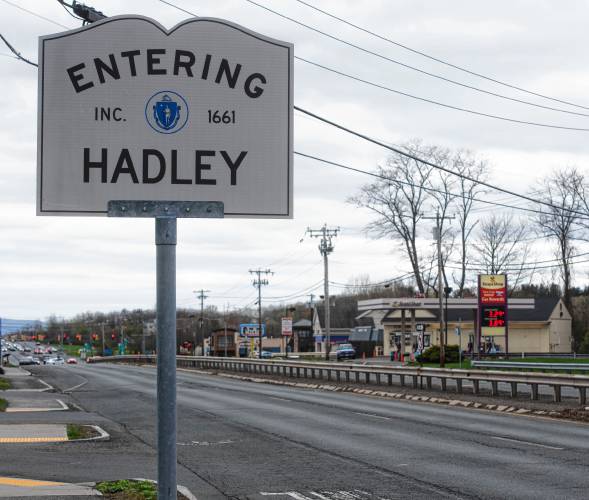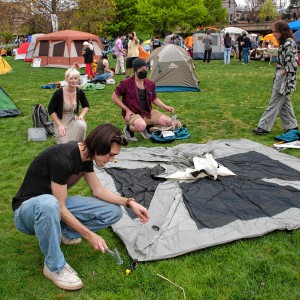Hadley planners advance battery storage bylaw

Hadley 04-19-2023
| Published: 04-18-2024 11:31 AM |
HADLEY — A bylaw that would allow standalone energy storage systems in most zoning districts in Hadley, but which would prohibit them in the aquifer protection areas, is being brought to annual Town Meeting next month, with an endorsement from the Planning Board.
But the board’s unanimous approval of the proposed bylaw for the May 2 Town Meeting is being characterized as a reluctant recommendation by Chairman James Maksimoski, who said the decision at Tuesday’s meeting is based on opinions from the Massachusetts attorney general that outright bans, including one enacted by the town of Wendell, run afoul of state law.
Maksimoski said the idea is to comply with state law that no local zoning ordinance or bylaw should unreasonably regulate battery storage and should be designed to protect health, safety and welfare. “Therefore, we can't prohibit,” Maksimoski said.
Under the proposed bylaw, large capacity energy storage systems would be allowed, whether connected to a solar generation or renewable energy project.
“This allows a battery storage system in conjunction with a solar panel system or as a standalone unit,” Maksimoski said.
The bylaw states where battery storage can be permitted, including all residential agricultural and industrial areas, but would be excluded from aquifer protection districts, which make up half or more of the town’s land mass. Maksimoski calls that a sensible approach for promoting health and welfare.
Other rules embedded in the bylaw include not allowing any removal of dirt to accommodate a battery system; the need for a fire hydrant to be within 300 feet of actual storage compartments, a request made by the fire chief and similar to subdivision regulations requiring hydrants every 500 feet; spill containers around anything that has liquid in it, holding 110% of the battery’s rated capacity; and all containers and spill containment being fire resistant and fire proof to 2,300 degrees Fahrenheit.
Planning Board member Michael Sarsynski, who voted to recommend, is critical of the need for the bylaw, though, stating that allowing battery storage has nothing to do with green energy, but rather with an electricity system in Massachusetts that is “slowly imploding” and where electricity users pay the the second highest rate in the country.
Article continues after...
Yesterday's Most Read Articles
 Pro-Palestinian protesters set up encampment at UMass flagship, joining growing national movement
Pro-Palestinian protesters set up encampment at UMass flagship, joining growing national movement
 Island superintendent picked to lead Amherst-Pelham region schools
Island superintendent picked to lead Amherst-Pelham region schools
 Sole over-budget bid could doom Jones Library expansion project
Sole over-budget bid could doom Jones Library expansion project
 State fines Southampton’s ex-water chief for accepting lodging and meals at ski resort, golf outing from vendor
State fines Southampton’s ex-water chief for accepting lodging and meals at ski resort, golf outing from vendor
 Authorities ID victim in Greenfield slaying
Authorities ID victim in Greenfield slaying
 2024 Gazette Boys Basketball Player of the Year: Marcielo Aquino, Amherst
2024 Gazette Boys Basketball Player of the Year: Marcielo Aquino, Amherst
“This is not a solar energy storage,” Sarsynski said. “It's sucking electricity from the grid, which is 90% not solar.”
Planning Board member Mark Dunn, though, said solar is a growing industry in Massachusetts and batteries are an important part of the state’s net metering system that allows surplus energy to be put back into the grid, or to be stored for future use.
“There's a certain satisfaction to saying no, but I don't see it a viable strategy here,” said board clerk William Dwyer. If the town turns down the bylaw or approves one that is rejected by the attorney general, then Hadley could have to approve battery storage anywhere and would be stuck with being guided by state rules.
“We’re allowed to regulate but not prohibit,” Planning Board member Joseph Zgrodnik said.
The board previously took feedback from concerned residents, including some who called for keeping a ban on standalone battery storage projects in place and fighting the state.
Prior to the board making its recommendation, just one resident offered comment.
“I just hope you come to a decision that is best for the town,” said Sean Mackin, who lives near a proposed standalone 5-megawatt battery system that would go into a gravel pit on Breckenridge Road, next to Zatyrka Park.
Scott Merzbach can be reached at smerzbach@gazettenet.com.

 A Waterfront revival: Two years after buying closed tavern, Holyoke couple set to open new event venue
A Waterfront revival: Two years after buying closed tavern, Holyoke couple set to open new event venue  Area property deed transfers, May 2
Area property deed transfers, May 2 Pro-Palestinian encampment disperses at UMass, but protests continue
Pro-Palestinian encampment disperses at UMass, but protests continue Amherst council confirms Gabriel Ting as police chief
Amherst council confirms Gabriel Ting as police chief
